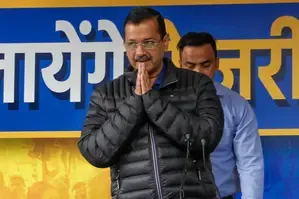FairPoint: Are Welfare Schemes Genuine or Just Ponzi Strategies? A Warning on Kejriwal’s Election Tactics

New Delhi, Dec 29 (NationPress) It is indeed a strange scenario where a Chief Minister unveils schemes while the government labels them as ‘fraud’. This might be an unprecedented occurrence in the history of Independent India, yet it seems to be the reality in the national capital.
Politics in Delhi has always been anything but ordinary, featuring numerous twists and turns since Arvind Kejriwal took the helm of the Aam Aadmi Party and formed the government. From staging a sit-in to disrupt the Republic Day celebrations in 2014, to spending a night on the sofa of the Lieutenant Governor in 2018, former Chief Minister Kejriwal has employed various unconventional tactics to win public favor, even attempting to portray his arrest and subsequent bail as a form of political ‘martyrdom’.
This unusual activism has undoubtedly secured him a majority in the Delhi Assembly three times—serving as Chief Minister from 2013 to 2014, again from 2015 to 2020, and once more in his current term. The seventh Delhi Assembly is set to conclude on February 15, 2025, necessitating the completion of the electoral process beforehand. As elections approach, Kejriwal and his party are striving to restore the trust of voters, which was significantly undermined when BJP candidates won all seven Lok Sabha seats in Delhi.
His strategy for the 2024 Lok Sabha elections was a complete fiasco, as he attempted to frame it as a public referendum on his arrest, which he claimed was ‘illegal’. However, voters rejected his candidates, proving that his ‘victim’ narrative did not resonate. His arrest was linked to corruption allegations involving the Delhi government’s 2022 policies regarding alcohol sales. Eventually, the Supreme Court granted him a three-week interim bail to campaign for the parliamentary elections, on the condition he would refrain from his duties as Chief Minister. Ultimately, the Apex Court granted him regular bail on September 13, 2024, after which he resigned and appointed Atishi as Chief Minister.
Denouncing all allegations against him, Kejriwal asserted he would only reclaim his position if voters re-elected his AAP in the forthcoming Assembly elections. With this commitment, he stepped down, aiming to win back public favor.
After the failure of his victimhood referendum tactic in the 2024 general elections, his best approach appears to be promising welfare benefits.
There’s nothing inherently wrong with making pledges to the electorate before an election; every party engages in this practice. Accordingly, Kejriwal, as AAP’s convenor, announced the ‘Mukhyamantri Mahila Samman Yojana’ and ‘Sanjeevani Yojana’ in anticipation of the upcoming elections. Registration for both initiatives began on December 23.
In the 2024-25 Budget, the Delhi government proposed the Mahila Samman scheme to provide Rs 1,000 monthly to all women above 18. However, on December 22, Kejriwal declared that this amount would increase to Rs 2,100 if his party regained power in the Assembly elections. He mentioned that AAP volunteers would visit homes to assist with registration, requiring beneficiaries to present their voter identity cards. He also introduced the Sanjeevani Yojana, stating that elderly individuals would be registered at their homes by AAP volunteers.
As Kejriwal, CM Atishi, ministers, MLAs, and AAP volunteers began home visits to gather data on potential beneficiaries, senior officials in the Delhi government issued public notices disavowing the registration process initiated by CM Atishi and her predecessor, Arvind Kejriwal.
This unprecedented move saw two Delhi departments publishing public notices asserting that the welfare schemes launched by AAP were not sanctioned by the government and were, in fact, 'non-existent'.
The Department of Women and Child Development (WCD) stated that the Mukhyamantri Mahila Samman Yojana does not exist and has not received approval from the Delhi government. It urged citizens to avoid sharing personal information with individuals or groups claiming to be associated with the ‘fake scheme’, as this could lead to identity theft or financial fraud.
The Health and Family Welfare Department also declared that the Sanjeevani Yojana is non-existent, advising the public to remain vigilant and not be misled by claims of 'fraudulent' free medical services.
The public notices have cast the AAP’s activities in the light of a Ponzi scheme, wherein participants are deceived. A Ponzi scheme is an investment scam that compensates early investors with funds from later investors to create a facade of significant profits. The two ‘unapproved’ schemes from AAP appear to be enticing individuals as if they are investing in AAP’s electoral victory, aiming to re-elect Kejriwal as Chief Minister for a fourth term.
Becoming the Delhi CM again is crucial for addressing the corruption cases against him, as Kejriwal has asserted. Winning the Assembly elections is vital for his political survival and AAP’s expansion. This underscores the importance of his promises for welfare schemes. The success of the Ladli Behna Scheme in contributing to the BJP’s victory in Maharashtra has provided Kejriwal with an effective strategy to achieve his ambitious goal of winning all 70 seats in Delhi.
(Deepika Bhan can be contacted at deepika.b@ians.in)










